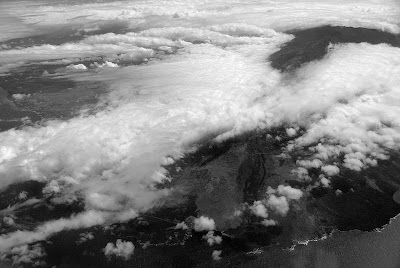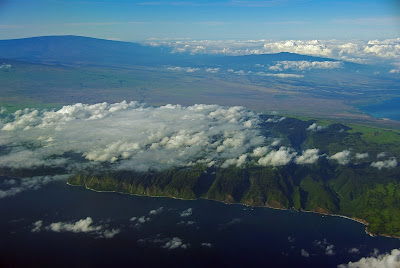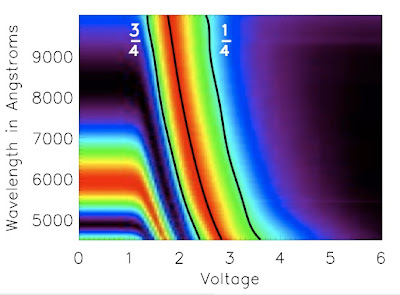The short-course somewhat made the Maui News this morning and I got a good lesson in PR out of it. I'm the 'lead instructor' and one of three content teachers for the Akamai Maui Short Course. Nina teaches the communication things and we're all under Lisa. However, MCC is launching a new bachelors program that some major institutions are involved with and Maui News decided to drop by. So.... since this was an article that focused on this new cirriculum, the 'big-wigs' decided to show up, displace all us lowly instructors (save Lisa), and disrupt the class for 30 minutes while they took pictures with our students. Now, the big-wigs deserve most of the credit - they pay for us to be there, they provide the structure and infrastrucure, and Lisa is the director of ISEE who created the whole program anyways. However, I found it incredibly interesting how much the event was about the right kind of picture being taken with the right people. The caption for the picture has most of the major participating institutes and great concern was expressed to make sure that IfA, CfAO and MCC got their names in the same space. Nowhere does the caption say that none of the pictured instructors actually taught the inquiry (save Lisa who's connection isn't even mentioned). Nowhere does the caption say that when Maui News says that Mark and Jung 'worked with' interns they meant that Mark and Jung interrupted the inquiry and were asking the students what they were doing. I don't know if I'd call that 'work with' so much as 'make it look like students are learning while teachers are teaching' so that the reader gets the right impression. IfA, CfAO, ISEE, MCC, AWI, AFRL, Senators and UH are all involved at some level and have chipped in $ in some way that I don't understand yet. This PR moment stimulated a lot of good questions in my head and I got some good discussions out of Lisa and Mark over lunch. The world of perception and institutional ideology is fascinating, complicated, directly related to my work life and frankly, scarry. One feels like a piece of flotsam in a big river.... This 4-year program is, I think, a very good thing and one Mark and many others have worked very hard to push forward. Can you imagine the type of political BS that would be involved in taking a 2-year community college to the 4-year level where it's competing inside a massive one-university-in-the-state system with players on all side either losing or gaining money, fame and fortune?

Assistant professor Mark Hoffman (third from left) and instructor Jung Park (third from right) work with Akamai Internship Program members Austin Barnes (striped shirt) and Devin Ortal (right) Tuesday morning at Maui Community College. Also pictured are Jeff Kuhn from the Institute for Astronomy (left) and Lisa Hunter from the Center for Adaptive Optics.
MCC readies launch of bachelor’s program
Courses geared toward 4-year engineering technology degree
By CLAUDINE SAN NICOLAS, Staff Writer
POSTED: June 10, 2009
Article Photos
The Maui News
KAHULUI - Maui Community College officials have lined up two provisional classes for this fall as the college prepares to launch its second four-year bachelor's degree program.
The courses are called intermediate optics and engineering computing, both of which - with other courses yet to be offered - could lead to a first-time bachelor of applied science in engineering technology from what would be known as University of Hawaii-Maui.
The University of Hawaii Board of Regents voted unanimously May 30 to approve MCC's second bachelor's degree proposal. The creation of the new degree triggered an application for the school to move from junior to senior commission accreditation from the Western Association of Schools and Colleges, which accredits four-year colleges and universities. With the new accreditation, MCC will most likely change its name.
The college already offers a bachelor's degree in applied business and information technology, and students can take distance learning classes on Maui for bachelor's and master's degrees from UH-Manoa, UH-Hilo and UH-West Oahu.
Following the regents' approval last month of the second bachelor's degree at MCC, Mark Hoffman, program coordinator/assistant professor of the Electronics and Computer Engineering Technology Program, went forward with lining up an instructor and scheduling the provisional classes for the fall.
Hoffman said there are as many as 12 students ready to apply for the new bachelor's degree program. But the classes to be offered this fall are provisional because MCC must first get its new accreditation. That process has begun and could be completed by summer's end, he said.
Jung Park, an instructor with a master's in electrical engineering and a doctorate degree in engineering science, will serve as the professor for the two classes. Park was hired into the Electronics and Computing Engineering Technology Program last year and has been teaching a few courses for those seeking an associate degree in electronics and computer engineering technology.
Hoffman, who has been working on establishing the engineering technology degree for at least two years now, said he has made contacts with private companies in the Maui Research & Technology Park as well as the Maui Economic Development Board, which said they need more highly educated workers on Maui.
"I think it's really fantastic for our students to get educated in technology and engineering and to build up Maui's technology industries," Hoffman said. "Companies no longer have to bring in people from the Mainland to work for them. They can hire here."
Following the expected approval of the intermediate optics and engineering computing classes this fall, Hoffman said he hopes to hire at least two more faculty members to teach the new bachelor's degree course requirements.
Students would be formally accepted into the program beginning in the fall of 2010.
The new bachelor's degree was developed in partnership with the University of Hawaii Institute for Astronomy Maui and the Center for Adaptive Optics.
Hoffman said MCC has also acquired as much as $693,000 in funding to establish the new bachelor's degree programs. Among the largest donors were the National Science Foundation and the office of UH Vice President for Research Jim Gaines. Also assisting in establishing the curriculum were the Akamai Workforce Initiative, a collaborative project headquartered at the UH Institute for Astronomy Maui; the Center for Adaptive Optics at the University of California, Santa Cruz; and the Maui Economic Development Board.
Additional program input was provided by the National Center for Optics and Photonics and the New England Board of Higher Education PHOTON 2 project.
Students entering the new bachelor program will benefit from access to the University of Hawaii's Institute for Astronomy Maui's Advanced Technology Research Center lab, the Faulkes telescope atop Haleakala and a P6 super computer installed at the Maui High Performance Computing Center, which was donated through a corporate community relations grant from IBM and valued in excess of $250,000.


















































